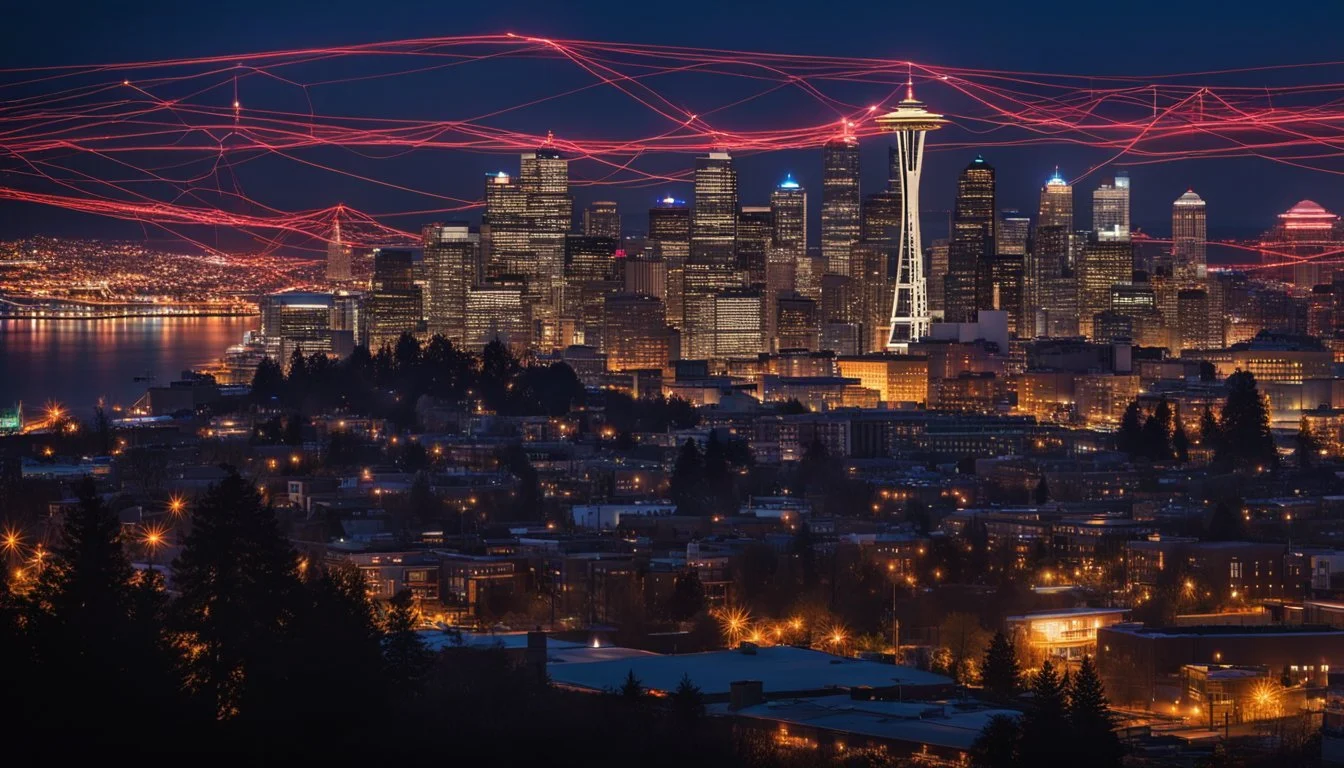8 Intriguing Documentaries About Cybercrime in Seattle You Can't Miss
Documentaries offer a unique way to explore complex topics, and those covering cybercrime in Seattle are no exception. Through gripping narratives and expert insights, these films unravel the intricate world of cyber threats and the efforts made to combat them. For anyone interested in the intersection of technology, crime, and urban life, these documentaries are a must-watch.
By shedding light on real-life cases and the evolving nature of cyber threats, these documentaries provide a comprehensive look at the digital battles being fought in and around Seattle. Viewers will gain a deeper appreciation of the challenges faced by cybersecurity professionals and the impact of cybercrime on society.
1) The Hacker Wars (2014)
"The Hacker Wars" dives into the complex world of modern-day hackers, presenting a duality between their activities and the government's corresponding reactions.
It presents profiles of prominent hackers who have boldly confronted secretive institutions.
Viewers gain insight into the motivations and methods employed by these controversial figures.
The film examines several high-profile cases, including interviews and perspectives from key players.
For more about "The Hacker Wars," visit IMDB.
2) Deep Web
"Deep Web" (2015) is a documentary directed by Alex Winter.
This film focuses on the arrest and conviction of Ross Ulbricht, the creator of the Silk Road, an online black market that operated on the dark web. Ulbricht's case draws attention to the complexities of internet freedom and privacy.
The documentary sheds light on the intricacies of the dark web, offering viewers a look into its hidden corners and the legal battles associated with it. It explores the motivations behind Silk Road and the immense challenges law enforcement faced while taking it down.
Winter provides interviews with law enforcement officials, Ulbricht’s family, and advocates of internet freedom, creating a balanced portrayal of the issues at hand. The depth of the research offers an engaging narrative for those interested in cybercrime.
For those intrigued by the mysteries and controversies of the deep web, "Deep Web" is a must-watch documentary. It effectively balances technical details with personal stories, making it accessible to a wide audience.
3) The Code: Story of Linux (2001)
"The Code: Story of Linux" is a documentary tracing the origins and growth of Linux, created in Finland in 2001.
The film focuses on the development of Linux by Linus Torvalds and highlights significant milestones and key figures in the free software movement.
It includes interviews with influential individuals such as Richard Stallman, Alan Cox, and Eric S. Raymond, detailing their contributions to Linux and its community.
The documentary provides insights into how Linux evolved from a hobby project to a robust, open-source operating system used around the world.
It also explores the collaboration culture that underpins the success of Linux, showcasing the transformative potential of open-source development.
For more information about this documentary, visit its Wikipedia page.
4) Terms And Conditions May Apply (2013)
The 2013 documentary "Terms and Conditions May Apply" by Cullen Hoback explores the troubling practices surrounding online privacy.
The film sheds light on how corporations and government entities collect and use personal information.
Particularly, it dives into the lengthy terms of service agreements that users frequently overlook when installing apps or browsing websites.
Through interviews and investigative research, Hoback reveals the sheer extent of data collection. Viewers are taken through various scenarios displaying how personal data is compiled, sold, and potentially exploited.
Seattle’s tech-hub status adds relevance, making this documentary significant for residents and businesses in the area.
To learn more about the film, visit Wikipedia.
5) Zero Days (2016)
"Zero Days" is a documentary directed by Alex Gibney that explores the complexities of cyber warfare.
The film focuses on Stuxnet, a self-replicating computer worm. This malware, developed by the United States and Israel, was designed to sabotage Iran's nuclear program.
Gibney's film is notable for its in-depth interviews with key figures in cybersecurity and intelligence. Experts like Eric Chien and Richard A. Clarke provide valuable insights.
The documentary also touches on the broader implications of cyber attacks. It highlights the vulnerability of national infrastructure to such threats.
"Zero Days" uses a mix of technical details and personal testimonies. This approach helps to unravel the intricate web of cyber espionage.
For more information, visit the IMDB page of Zero Days.
6) The Internet's Own Boy: The Story of Aaron Swartz (2014)
"The Internet's Own Boy: The Story of Aaron Swartz" is a biographical documentary directed by Brian Knappenberger.
This film dives into the life and work of Aaron Swartz, a notable computer programmer, writer, and political organizer.
Aaron Swartz was known for his contributions to web development and his advocacy for a free and open internet.
Through interviews with his family, friends, and notable internet figures, the documentary paints a vivid picture of his relentless fight for information freedom.
The film not only chronicles his technical achievements but also the legal challenges he faced, which ultimately led to his tragic death at the age of 26.
For more information, visit The Internet's Own Boy on IMDb.
7) We Are Legion: The Story of the Hacktivists (2012)
We Are Legion: The Story of the Hacktivists delves into the shadowy world of Anonymous, offering a deep dive into the operations and ethos of this infamous hacktivist collective. The documentary, directed by Brian Knappenberger, presents insightful interviews with members of Anonymous, shedding light on their motivations and methods.
The film highlights Anonymous' commitment to free speech and exploration of digital activism. Known for high-profile cyber attacks and protests, Anonymous views these actions as forms of civil disobedience in the digital age. This documentary explores significant events and campaigns orchestrated by the group.
In examining their activities, We Are Legion also addresses the controversies surrounding Anonymous. Perspectives range from viewing them as digital Robin Hoods to dangerous cyber criminals. The documentary balances these viewpoints, providing a comprehensive look at the group's impact on modern culture and technology.
Viewers will find a fascinating exploration of how Anonymous challenges power structures and advocates for transparency and freedom. This film is a must-see for anyone interested in cyber activism and the complex ethical questions it raises.
For more information on We Are Legion: The Story of the Hacktivists, visit IMDb.
8) Citizenfour (2014)
Citizenfour, directed by Laura Poitras, is an acclaimed documentary revolving around Edward Snowden and the revelation of the NSA's mass surveillance programs.
The film chronicles Snowden's clandestine meetings with Poitras and journalist Glenn Greenwald in Hong Kong. Their discussions expose the scale and reach of the U.S. government's data collection efforts.
Released in 2014, Citizenfour provides a raw, riveting look into modern cyber espionage. The documentary received numerous accolades, including the Academy Award for Best Documentary Feature.
Citizenfour remains a significant work for those interested in privacy, government surveillance, and the ethical dilemmas of whistleblowing. Its real-time unfolding adds a gripping element to the narrative.
More information about Citizenfour
Historical Context of Cybercrime in Seattle
Seattle's place in the history of cybercrime includes early prominent hackers and defining cybercrime cases that have shaped broader cybersecurity practices.
Early Cases and Pioneers
Seattle has a storied history with technology and cybercrime. In the early days of the Internet, hackers such as Kevin Mitnick made headlines. Mitnick, though originally from California, had significant interactions with Seattle's tech community and went on to become one of the most well-known figures in cybersecurity. His exploits in the 1970s and 1980s included breaching some of the most secure computer systems in the United States, leading to significant changes in how digital crimes were prosecuted and mitigated.
Pioneers in the Seattle tech scene also contributed to the understanding and development of cybersecurity measures. Local universities and tech companies have emerged as leaders in innovative cybersecurity practices. Their early research and technological advancements laid the groundwork for many of the digital protections used today.
Major Cybercrime Incidents
Seattle has been the site of several major cybercrime incidents that have had lasting impacts. In the 2000s, various tech startups and established companies within the city faced breaches that exposed critical vulnerabilities. One notable incident was the breach at a major Seattle-based online retailer, which resulted in the theft of millions of user records. This breach led to increased scrutiny and significant investments in better cybersecurity protocols.
More recently, a 2019 data breach at Capital One, which has a significant presence in Seattle, compromised the personal information of over 100 million people. The individual responsible for the hack, who was based in Seattle, exploited a configuration vulnerability in the company's infrastructure. This incident underscored the ongoing risks and the need for vigilance in cybersecurity.
Impact of Cybercrime on Seattle's Tech Industry
Cybercrime in Seattle has resulted in significant economic losses and has spurred heightened regulatory measures aimed at protecting both businesses and consumers.
Economic Consequences
Seattle's tech industry has suffered notable financial setbacks due to cybercrime. Cyberattacks, such as ransomware and data breaches, have disrupted operations for both established tech giants and smaller startups. For example, a recent cyberattack on the Seattle Public Library led to comprehensive system outages, highlighting the vulnerability of even public institutions.
The cost of mitigating these attacks includes not only direct monetary losses but also expenses related to improving cybersecurity infrastructure. Firms invest heavily in safeguarding their systems, which can impact their profitability. Additionally, customer trust can be severely diminished, leading to potential revenue drops and long-term reputational damage.
Regulatory Responses
Regulatory bodies have responded robustly to the increasing threat of cybercrime in Seattle. Local and state governments have implemented stringent cybersecurity laws to enforce higher standards of digital security. These regulations mandate businesses to adopt more rigorous data protection practices and comply with industry-specific guidelines.
To ensure compliance, regular audits and cybersecurity assessments are conducted. Insufficient adherence can result in hefty fines and legal repercussions. Awareness campaigns and workshops are also organized to educate employees about the importance of cybersecurity, emphasizing proactive measures and prompt reporting of suspicious activities. These efforts aim to create a resilient digital environment and fortify the tech industry against future threats.
Notable Investigations and Law Enforcement Efforts
Law enforcement in Seattle has been proactive in combating cybercrime through collaborative efforts with federal agencies and the establishment of local task forces. These operations have led to significant breakthroughs in cybercrime investigations.
Collaborations with Federal Agencies
Seattle's law enforcement frequently collaborates with federal agencies such as the FBI and Department of Homeland Security. This partnership is critical in addressing sophisticated cyber threats that transcend local borders.
For instance, the FBI's Cyber Division has provided Seattle with crucial resources and expertise, enabling the dismantling of complex ransomware networks. These joint operations have resulted in several high-profile arrests and significant disruption of criminal activities.
Moreover, federal collaboration has enhanced intelligence-sharing capabilities. This synergy allows for swift identification and response to emerging cyber threats. The combined efforts ensure that local authorities maintain a robust defensive posture against cybercriminals.
Local Cybercrime Task Forces
Seattle has also established specialized cybercrime task forces to handle the growing threat. These units are composed of local law enforcement officers trained in digital forensics and cyber investigation techniques.
One key initiative is the formation of a regional task force focusing on cyber fraud and identity theft. This task force works closely with local businesses and residents to provide education and resources on cybercrime prevention.
Additionally, advanced cyber units have been developed to address specific threats like child exploitation and financial fraud. These units leverage the latest technology and investigative approaches to track down and prosecute cybercriminals effectively. This localized effort complements broader federal collaborations, ensuring comprehensive coverage in combating cybercrime.








